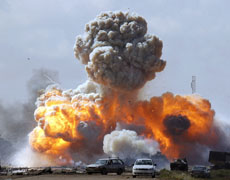Ilankai Tamil Sangam30th Year on the Web Association of Tamils of Sri Lanka in the USA |
|||
 Home Home Archives Archives |
Libya and the Responsibility to Protectby Jayshree Bajoria, Council on Foreign Relations, New York, March 24, 2011

Coalition forces conduct air strikes along a road between Benghazi and Ajdabiyah. (Goran Tomasevic/Courtesy Reuters) As international efforts to create a no-fly zone over Libya continued into their sixth day (CNN), debate has increased about a UN resolution effectively ordering Libyan leader Muammar al-Qaddafi to end civilian killings and whether it's being applied properly in Libya. UN Security Council Resolution 1973 imposes a no-fly zone and authorizes member states to "take all necessary measures" to protect civilians under attack from the Qaddafi's government. Proponents of the measure have hailed it as a victory (TheStar) for the "Responsibility to Protect" (R2P) doctrine, while critics say is being used for political (Hindu), and not purely humanitarian, purposes. The R2P concept, unanimously adopted by UN member states in 2005 as part of an outcome document, emerged out of the international community's inability to halt genocides like those in Rwanda and Bosnia. According to the doctrine, if a state fails to protect its citizens from "genocide, war crimes, ethnic cleansing, and crimes against humanity," it becomes the international community's responsibility to do so. As thisBackgrounder notes, it includes use of military force by the international community if peaceful measures prove inadequate. It is this provision that the doctrine's supporters point to for justifying the air strikes in Libya by some Western countries, including the United States. "The international military intervention (SMH) in Libya is not about bombing for democracy or Muammar Qaddafi's head," says Gareth Evans, a principal author of the R2P concept. "Legally, morally, politically, and militarily it has only one justification: protecting the country's people." R2P proponents also point to regional backing for the no-fly zone from organizations such as the Arab League, the Gulf Cooperation Council, and the Organization of the Islamic Conference, stressing its international legitimacy. But as governments in Yemen and Bahrain also turn violent against protesters and civilians, critics question the selective use of R2P for what the White House calls "limited humanitarian intervention (Yahoo), not war" in Libya. Marjorie Cohn, a law professor at the Thomas Jefferson School of Law, argues the Obama administration is silent on Yemen and Bahrain (HuffingtonPost) because they are close U.S. allies. The White House has condemned the violence in those two countries too, urging their governments to show restraint, but any stronger action has yet to be taken. Others note more pressing cases for humanitarian intervention--from the Democratic Republic of Congo to the Ivory Coast--to question Libya as the R2P test case. Yet CFR's Stewart Patrick says: "Just because the international community can't or chooses not to act everywhere doesn't mean that it shouldn't act anywhere when there is sufficient political will to be mobilized." Patrick admits geopolitical factors play a role in any intervention: "There is bound to be selectivity and inconsistency in the application of the responsibility to protect norm given the complexity of national interests at stake in U.S. calculations and in the calculations of other major powers involved in these situations." James Traub argues that Libya presents the best case for intervention because unlike in Congo or Darfur, here "force could work (ForeignPolicy)." In Bahrain, Patrick says, the United States has other forms of leverage "which were absent in the Libyan case or were tried and found wanting." However, CFR's Micah Zenko calls for caution. "The trouble is, although we are prepared to 'do something' and pull out the most impressive kit in the U.S. toolbox--military power--we aren't actually willing to get involved at the level required to win," he writes. This, he says, "does more harm than good" (ForeignPolicy). The biggest questions surrounding the mission in Libya are about its objectives, its command structure, and its likely duration. There is no clarity over end-goals or criteria for success, and in the current civil war, "there is little reason to be confident (Politico) the opposition will be able to constitute a benign, national alternative," says CFR President Richard N. Haass. Additional Analysis: Daniel Korski of the European Council on Foreign Relations recommends a UN-mandated, Egyptian-led, NATO-enabled peacekeeping force to take over once the fighting is over. Background: Read the full text of the R2P here |
||
|
|||